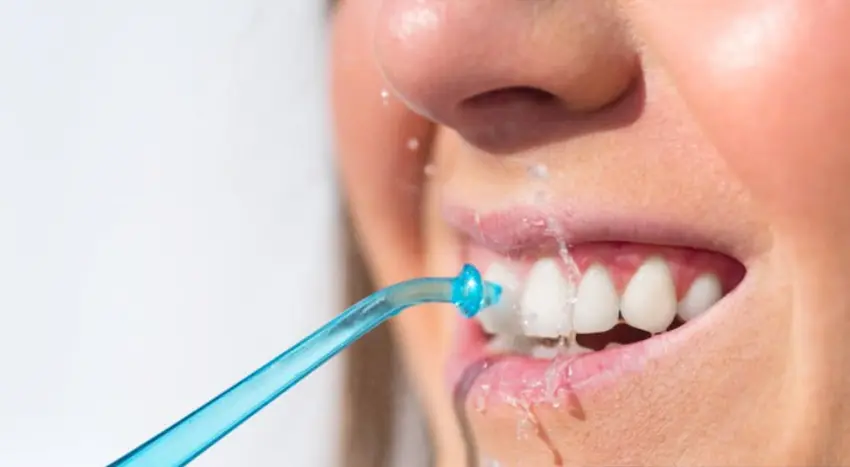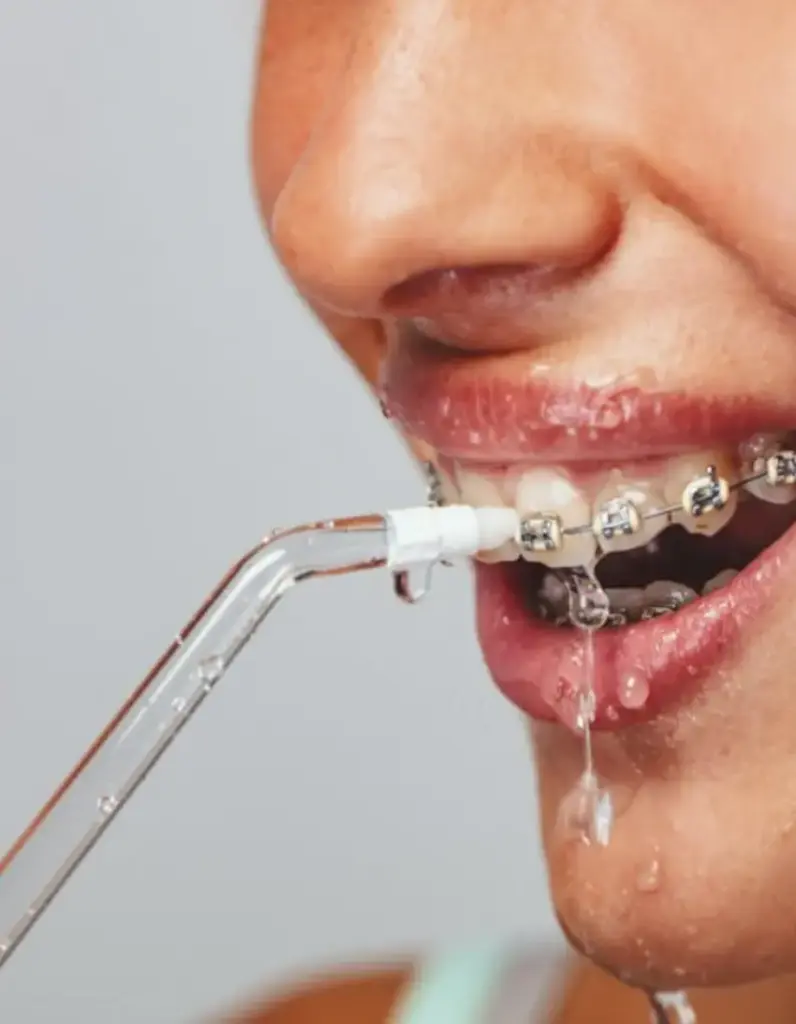Does a Water Flosser Damage Teeth?

Water flossers, also known as oral irrigators, are instruments that are widely used to keep the mouth healthy. They employ a powerful stream of water to remove plaque from in between teeth, around the gumline, and in spots where the regular floss can’t reach. Thus, quite naturally, the question may arise: Can a water flosser harm my tooth?
There is every reason to believe that water flossers are entirely safe and efficient if practiced in the right way. Moreover, they might become a favorable element in your daily dental care regimen, offering you an opportunity to get rid of more plaque and thus improve the health of your gums. However, all these benefits can be enjoyed only on the one condition, that this dental device is used as advised.
This quest will talk about the operating principles of a water flosser, its influence on the teeth, and the safest ways of using it for the best possible outcomes.
How Does a Water Flosser Work?

A water flosser employs a pulsating stream of water to remove food particles, plaque, and bacteria from the spaces between teeth and along the gums. The appliance usually comes with a pressure regulator that allows you to choose the strength of the water jet. Certain models also contain various tips for different purposes and which you can use for gum massage, flossing braces, and cleaning removable or permanent bridges.
This back and forth movement of the water is instrumental in detaching the particles from the deeper layers and driving them out. Thus, the water flosser offers an alternative method to the traditional one, which sometimes may not be suitable for people with sensitive gums or certain dental disorders.
Can a Water Flosser Damage Teeth?
Contrary to the word of mouth, a water flosser is basically safe for your teeth and will not lead to harm if you apply it correctly. The following are some of the reasons:
1. Gentle Cleaning Action
Water flossers are using water pressure to clean between the teeth, a process that is not only easier than flossing but also more gentle. Traditional flossing often causes discomfort or even minor abrasions in the gums, while water flossers are milder and are less likely to become a problem if handled properly.
The direction and power of the water stream occur in such a way that food particles and plaque are removed gently from the teeth and gums without causing any damage. A turning of the water jet flow is available, so if you have sensitive gums and teeth, you can select a lower setting.
2. No Risk of Enamel Erosion
Water flossers are not like enamel-eroding agents (by being too rough with your toothbrush when cleaning your teeth or by using toothpaste that has bits of abrasive material). During the cleaning process, the water jet stream is soft and non-abrasive and thus, it will not resurface your enamel. Therefore, people that are concerned about the possibility of causing damage to the protective layer of the teeth should not be worried; this is a safer tool for them.
3. Effective for Plaque Removal
Among other tasks, water flossers excel in removing plaque and other bits from between the teeth and the gumline. Since no timely action is taken right away, a layer of plaque starts forming, which can solidify into tartar and lead to gum disease, cavities, and tooth decay. By regular use of a water flosser, you will keep your teeth clean and free of plaque while still avoiding any enamel issues.
4. Can Be Gentle on Sensitive Gums
For those with gum sensitivity or people who have dental work like braces, crowns or implants, the use of water flossers is a perfect choice. A soft balls of water are being used to clear the teeth so no pain will be resulted, and it will also be good to wipe off the plaque at the same time. In other words, water flossing can be less painful and more efficient in the case of sensitive gum. This may not be the case for those who are comfortable with the use of dental floss.
Potential Risks of Using a Water Flosser Incorrectly
When not used properly, water flossers can sometimes do more harm than good to your teeth. Here is what you should be aware of:
1. Too High of a Pressure Setting
High pressure settings can be quite discomforting to the gums as they are more susceptible to the irritation or damage especially if they are already sensitive. On some occasions, high levels of pressure may cause the gums to go down hence leading to gum recession. This will eventually expose the roots of the teeth and thus become a source of tooth sensitivity.
Tip: Your first pick should be low pressure indeed. You can then increase your water flosser settings once low-pressure settings gain your confidence. Lower pressure in case of feeling any discomfort.
2. Directly Aiming the Jet at Teeth for Too Long
Despite the fact that the water flosser is made to clean the teeth and gums, focusing the water jet directly on any of your teeth may cause discomfort, most especially if the said teeth have some dental work on them like fillings or crowns. Apart from that, shooting the water with a high power for a prolonged time can lead to irritation of the sensitive parts.
Tip: Keep the water flosser nozzle steady and keep it off the gum line. Try moving the nozzle in a circular motion over the gumline instead and eventually between the teeth. Be careful to try and avoid concentrating the water too much in one area.
Advantages of a Water Flosser
A water flosser properly used has a number of benefits which can be instrumental in improving your oral health in general:
1. More Efficient Plaque Prevention
Water flossers are known to eliminate up to 99.9% of plaque from the treated areas, a measure that aids in the prevention of cavities and gum disease. This is of the utmost importance in the case of people with braces, implants, or bridges, where ordinary floss may not be very helpful.
2. Happier Gums
Water flossing is a pain-free way to prevent gum diseases and to alleviate allergic reactions. They are helpful in excreting the bad bacteria from under the gum, which ultimately results in healthy gum status making it easy to maintain.
3. Time-Saving and Comfort
A water flosser is a much easier and comfortable option compared to traditional floss, for people who find it hard to use the latter. It’s quick, simple to use, and doesn’t need any special skills.
Summary
A water flosser is a risk-free and an efficient solution to have in your mouth-care routine. Proper use of it will only people teeth clean without damaging their teeth or gums, and at the same time, strengthen them against dental issues like plaque and gum disease. Water flossers are especially beneficial for those with hypersensitive gums, dental work, or those who have difficulty using traditional floss.
If you prefer a simple and painless way of keeping both your teeth and gums clean, then incorporate the use of a water flosser in your daily routine. Nonetheless, like every dental tool, it’s important to use it correctly and follow the instruction which the manufacturer has given to avoid potential problems.
At Lema Dental Clinic in Istanbul, Turkey, we can give you the best advice to take care of your teeth and mouth and assist you on your way to a clean and healthy smile be it water flossing or manual flossing. Make your appointment with us now to get more information!
No, water flossers are safe for teeth and will not damage enamel or cause tooth decay when used correctly.
Using excessive pressure or holding the water jet in one spot for too long may irritate the gums. It’s important to use the lowest setting initially and avoid prolonged exposure to the same area.
Water flossers are highly effective at removing plaque and food particles from between teeth and along the gumline. They are often more efficient than traditional floss, especially for people with braces or other dental work.
Yes, water flossers are especially beneficial for people with braces. They can clean around brackets and wires more effectively than traditional floss.
It’s recommended to use a water flosser at least once a day as part of your oral hygiene routine, along with brushing and flossing.




